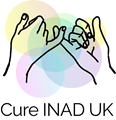Story
Javeria was born healthy at 7lbs 11oz. She was meeting all milestones and in many ways she was achieving higher than the standard targets. She would love to read, she would say words and point at books. She was always smiling and loved to eat and try new textures. She had a very cheeky personality. She was very much a ‘I know what I want’ girl.
At the age of 16 months, my daughter was able to crawl and say words, she would cruise furniture and climb stairs. She would make her own way mysteriously out of the room and would say ‘no’ if we followed her.
When she got to 18 months, we realized that she developed a squint in her right eye. We could see a change in her mobility skills as she no longer would move off one spot, she was not interested in walking much anymore. As months went on, we saw a difference in the way she would crawl, as she would often fall flat trying to move from the crawling position. Months went on and Javeria lost her ability to speak and even say mama and dada. A year changed dramatically in our lives as Javeria was no longer able to bear weight without support. She lost the ability to talk and would only mumble.
As parents, we always thought of Javeria growing up to have a big personality, who wanted to be independent, as she wanted to do everything alone from such a young age. No one could feed her because she wanted to use the spoons in both hands and feed herself, she would take total control of everything. After many trips to the hospital, she was diagnosed with an ultra-rare condition called Infantile Neuroaxonal dystrophy (INAD) that has no cure. This is an ultra-rare inherited disorder affecting 200 children around the world. The disease affects the nerve axons conducting messages from the brain to parts of the body which causes a progressive loss of visual, physical, and mental skills. INAD has an autosomal recessive pattern which means each parent could be a carrier of the PLA2G6 mutation but not show any effects.
When this came to our attention I was already expecting my second child Salahudin. When he was born we had him checked and we were hit with the same sad news again. Unfortunately, he was also born with the same genetic mutation as Javeria. As Salah grew we would just wait for symptoms to become apparent, it was the worst thing we could ever imagine, looking out for our son to also regress. Salah was cruising furniture and even talking at 14 months he would go up to his sister and play with her and cuddle her. As parents, we hoped that maybe this time it would be different as he was doing so well.
It was only after 16 months we noticed a squint in his right eye and that's when it became real for us. Months went on and he was no longer able to play with his sister or stroke her. He was no longer able to walk over to her or move any closer to her. He stopped weight bearing and stopped being able to move independently. From being able to cuddle her, it became just staring at her from his seat...
Javeria is now at the age of 6 and Salah is at the age of 4. They have both lost the ability to have any trunk control and are unable to walk, stand, or even sit. They are no longer able to communicate or talk to one another. From being little kids who used to love getting messy and snatching food from one another to eat, they can no longer support themselves. They are both having to partially be tube fed to keep their nutrients up and save them from aspirating.
INAD changed our lives completely and it is the hardest thing as parents we have had to face. We thought of them growing up to be kids who enjoyed football or ballet and demanded a lot of things, or even bickering amongst siblings, but we never got to see those days. We wish they would at least be able to communicate with one another or see each other without being visually impaired.
INAD ate away at my children leaving them non-verbal and dependent on their family. Every day is a struggle to see my determined children go through so much. Even though their physical strength is not by their side, they are always trying to get involved by smiling and trying to lift their hands to touch our faces and each other, even if it is to give each other emotional support. We as a family want to raise awareness of their condition and hope for gene therapy to be delivered quickly to help bring back the days we have lost or to even give them a longer life for us to carry on as a family.
Please Donate Today, and thank you for helping to save our children's lives!
